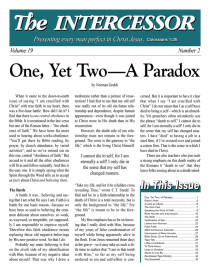
Justification of War
The war with Saddam Hussein is over, and the predictably slow and messy process of rebuilding Iraq has begun. The discovery of torture chambers and mass graves substantiates President Bushs leadership in the successful effort to oust Saddam, regardless of the paucity of hard evidence of weapons of mass destruction. The American public believes the war was just, and even early critics of the war effort (e.g. Tom Friedman of the New York Times) have had a change of heart.
I have always believed that we were right to lead the effort to liberate Iraq from a murderous tyrant and his thugs. The argument for ridding Iraq of nerve gas, anthrax, and nuclear warheads has also made sense to me. I love our President and have trusted him completely to do what is best for our country.
However, others have not been so convinced. I have been amazed at the number of religious leaders, the Pope to name one, who decried the war effort as unjust despite the undisputed belief that Saddam is a really bad guy. Clearly, deep philosophical differences exist in the world regarding the spiritual nature of war. Simply put, people have widely differing opinions on what God thinks about war.
I believe that Norman Grubb does a masterful job of sorting this out. In Once Caught, No Escape, Norman replays for us his experiences as first a soldier, then a missionary and citizen. In WWI, Norman received Englands Military Cross for his actions on the battlefield. Later in life, he decided that it might be wrong for a Christian to take up arms against another human being, particularly when the Bible so clearly says to love your enemies. This never really set well with him though. He had a hard time believing that war was wrong, while at the same time enjoying the freedoms of a world without Nazism and Fascism won by the blood of his own countrymen.
Norman eventually saw that the world was comprised of both the redeemed and the unredeemed. The unredeemed, until born again, are self seeking with no inner control by the law of God written on their hearts by the Holy Spirit. Therefore, there must be mechanisms of outer control, such as laws, police, courts, governments, and, yes, armies. He realized that how we work on an individual level is different than how we work on a corporate or societal level. Personally, if Christ is living our life, we seek to overcome hatred with love, evil with good. We love the sinner but hate the sin. On a bigger level, we cannot do this. A country cannot turn the other cheek when the forces of evil are hurting someone else, and we are unaffected. We must go to their defense. And when our efforts are successful, we then turn around and help the rebuilding of the defeated nation.
Norman understood that we have obligations on the law level to the world and society, but on the personal level, we live by a Christ-life standard. The two are not mutually exclusive.
Norman witnessed the United States defeat then rebuild Germany and Japan. Today, he would see us doing the same in Afghanistan and Iraq.





